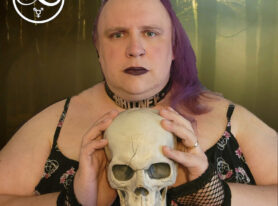Tag archive: HWA Pride Month Archives - Horror Writers Association [ 54 ]
A Point of Pride: Interview with Lee Mandelo
Lee Mandelo (he/him) is a writer, critic, and occasional editor whose fields of interest include speculative and queer fiction, especially when the two coincide. His debut novel Summer Sons, featured… Read more
A Point of Pride: An Interview with Lor Gislason
Lor Gislason (they/he) is a non-binary homebody and the author of Inside Out. They are also the editor of Bound In Flesh: An Anthology of Trans Body Horror. Find them… Read more
A Point of Pride: Interview with Andrew Robertson
Andrew Robertson is a queer horror writer and editor. He recently released a dual-author short story collection with Sèphera Girón, Dearly Departed, available from the Great Lakes Horror Company. The… Read more
A point of Pride: An Interview with Wendy N. Wagner
Wendy N. Wagner is a writer and Hugo award-winning editor. Her books include the forthcoming cosmic horror novel The Creek Girl (Tor Nightfire, 2025), The Deer Kings, The Secret Skin,… Read more
A Point of Pride: Interview with Joe Koch
Joe Koch (He/They) writes literary horror and surrealist trash. Their books include The Wingspan of Severed Hands, Convulsive, and The Couvade, which received a Shirley Jackson Award nomination in 2019.… Read more
A Point of Pride: Interview with Michael R. Collins
Michael R Collins was born at a very young age in the wilds of southern Idaho. After a few decades, he finally got his fill of all the sagebrush and… Read more
A Point of Pride: Interview with Ruth Anna Evans
Ruth Anna Evans is a writer, anthologizer, and cover designer who lives in the heart of all that is sinister: the American Midwest. She has been composing prose of… Read more
A Point of Pride: Interview with Eboni J. Dunbar
Eboni J. Dunbar (She/her) is a queer, black woman who writes queer and black speculative fiction. She lives in the San Francisco Bay Area with her partner. She received her… Read more
A Point of Pride: Interview with L. Stephenson
Out to his family and friends since he was sixteen, L. Stephenson’s short stories and poetry have been haunting horror anthologies and online magazines since 2018, the best of which… Read more
A Point of Pride: Interview with Brent Lambert
Brent Lambert is a Black, queer man who heavily believes in the transformative power of speculative fiction across media formats. As a founding member of FIYAH Literary Magazine, he turned… Read more
A Point of Pride: Interview with James Lefebure
James Lefebure is a Scottish-born, Liverpool-living horror author. Splitting his time between watching horror, reading horror and writing horror, he can often be found arguing with people that Jason would… Read more
A Point of Pride: Interview with Arley Sorg
Arley Sorg is an associate agent at kt literary and co-Editor-in-Chief at Fantasy Magazine. He is an SFWA Solstice Award Recipient, a Space Cowboy Award Recipient, a two-time World Fantasy… Read more
A Point of Pride: Interview with Vince A. Liaguno
Vince A. Liaguno is an award-winning writer, anthologist, editor, and an occasional poet. He is the Bram Stoker Award®-winning editor of Unspeakable Horror: From the Shadows of the Closet (co-edited… Read more
A Point of Pride: Interview with Corey Niles
Corey Niles was born and raised in the Rust Belt, where he garnered his love of horror. His debut horror novel, Blood & Dirt, was released from NineStar Press in… Read more
A Point of Pride: Interview with Joshua Viola
Joshua Viola is a 2021 Splatterpunk Award nominee, Colorado Book Award winner, and editor of the StokerCon™ 2021 Souvenir Anthology. He is the co-author of the Denver Moon series with… Read more
A Point of Pride: Interview with Gretchen Felker-Martin
Gretchen Felker-Martin is Massachusetts-based horror writer and film critic. Her debut novel, Manhunt, is out now from Tor Nightfire. You can follow her work @scumbelievable on Twitter.
What inspired you… Read more
Point of Pride Intro: Always Keep Your Pride, Shatter the Closets by Maxwell I. Gold
By: Maxwell I. Gold
A few weeks ago, men dressed in black and red clothes, carrying flags of an evil undeserving to be named. Their chants and slogans—there will be… Read more
Transgender Awareness Week: Catching up with Larissa Glasser
Catching Up With Larissa Glasser
Larissa Glasser is a librarian-archivist from New England. She writes dark fiction centered on the lives of trans women, library science, and heavy metal. Her… Read moreTransgender Awareness Week: Catching up with Britney Everlong
Copyright 2022 The House of Everlong
Britney Everlong began writing at an early age, her first book being “The Whatchamacallit”, written at the age of nine. It would be some… Read more




